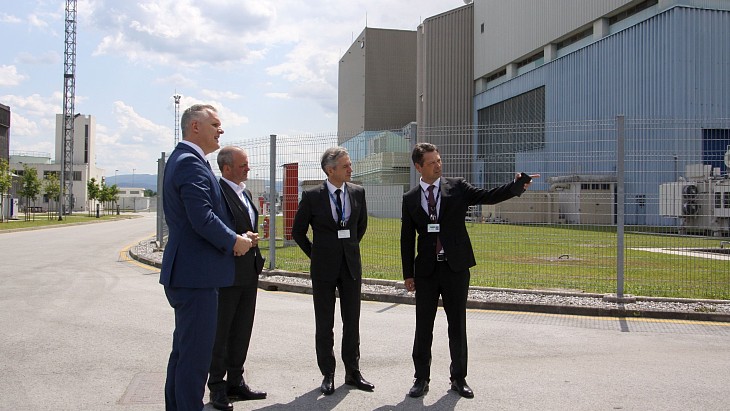During a visit to the Krško nuclear power plant, Golob said: "Slovenia is, and will remain, a nuclear country. We have a lot of knowledge in the field of nuclear technology, which we must use in the construction of the JEK2 unit. The government will make a conceptual decision and initiate the necessary procedures on 1 August. We are aligned with GEN Energija, because it is crucial that we work together."
He said that although countries across Europe have different views on nuclear energy, he believes: "In the end it will turn out that nuclear energy is almost certainly the only reliable source of basic energy for Europe ... Slovenia, despite its good energy mix, unfortunately does not have surplus energy, we have to import quite a bit of it. Not only gas, oil, but also electricity. We need to increase our own production."
The prime minister said steps would be taken to speed up the process, saying that a state secretary would be appointed in the cabinet to oversee the JEK2 project, as well as a special law brought in to optimise the likely timeline for the development.
Krško is owned and operated by Nuklearna Elektrarna Krško (NEK), which is jointly owned by Croatia's Hrvatska elektroprivreda (HEP Group) and Slovenia's GEN Energija.
Dejan Paravan, CEO of GEN Energija, briefed the prime minister about the state of their plans, saying that the application "for the preparation of the state spatial plan for JEK2" was being put together "in such a way that a power plant with a higher power could be placed in the space. The energy permit issued by the Ministry of Infrastructure in July 2021 was limited to 1100 MW. By increasing the power, we want to expand the range of potential suppliers, and with a stronger unit, we also open up better possibilities for concluding a strategic partnership".
Krško, a 696 MWe pressurised water reactor, is Slovenia's only nuclear power plant and generates about one-third of its electricity. The plant, which is co-owned by neighbouring Croatia, began commercial operation in 1981, and a 20-year extension to its initial 40-year operational lifetime was confirmed in mid-2015.
GEN group says that, under the the existing plans for JEK2, it could provide 8 TWh electricity per year, bringing with it the benefits of being able to reduce the need to import electricity, cut CO2 emissions as well as being used for district heating schemes and providing jobs and skills across the Slovenian economy.
During a visit to the nuclear plant last year, Prime Minister Golob said there would need to be a referendum held to get public approval as part of the process for the JEK2 project. The government has said that a construction decision will be taken by the end of 2027.





_52351.jpg)


_15863.jpg)






